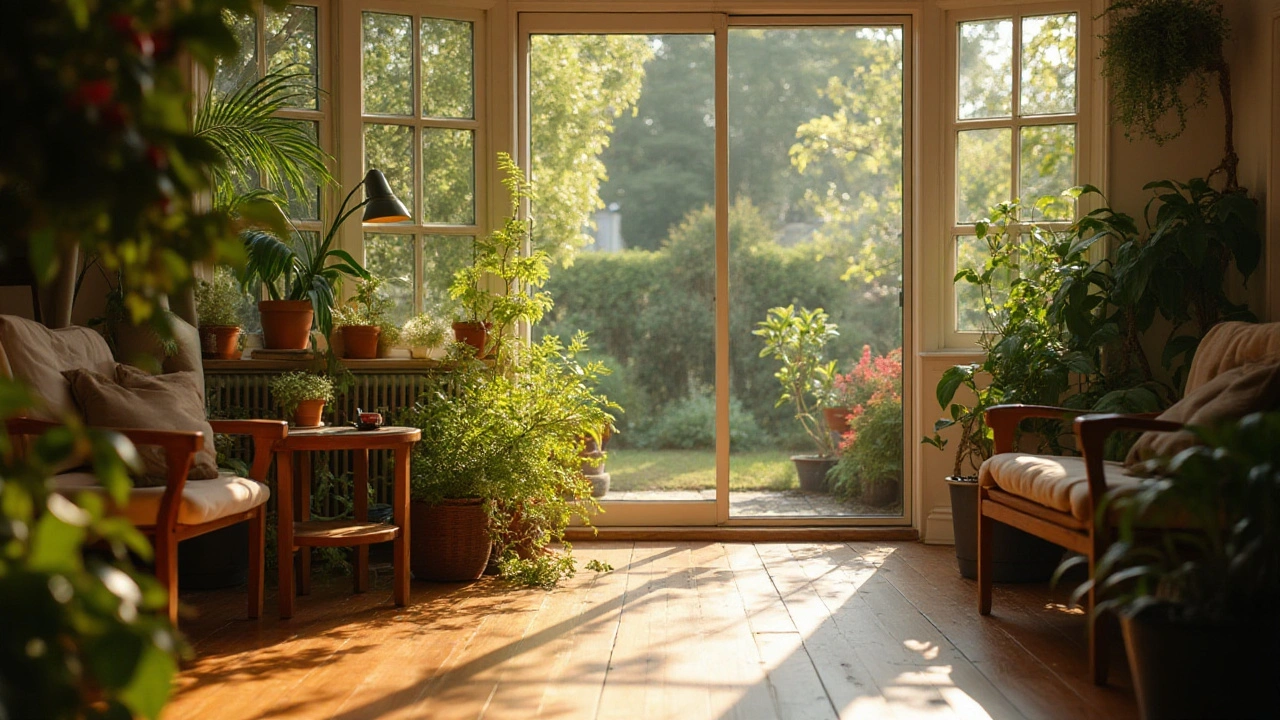Most people are familiar with the idea that sunlight helps our bodies produce vitamin D, an essential nutrient for bone health. But did you know there's a lot more to this golden ray's influence on our well-being? From lifting our spirits to regulating our sleep cycle, sunlight offers several advantages that might just surprise you.
Getting a daily dose of sunshine doesn't just make you feel good; it can activate processes that boost your health in subtle and important ways. So, how exactly does sunlight work its magic beyond vitamin D production, and how can you make the most of its benefits without overdoing it? Let's shine a light on these questions and more as we explore the sunny side of health.
- More Than Just Vitamin D
- Mental Health and Sunlight
- Sunlight's Role in Sleep Regulation
- Safe Sun Exposure Tips
More Than Just Vitamin D
The marvel of sunlight extends far beyond its famous ability to help our bodies synthesize vitamin D. Sunlight interacts with us on a cellular level, driving processes that contribute to a harmonious bodily function. Notably, one of its lesser-known benefits is its role in serotonin production—a crucial hormone associated with mood elevation. When sunlight enters the eye, it triggers the release of serotonin, a neurotransmitter that contributes to feelings of happiness and calm. It’s no wonder that sunny days often bring about smiles and a sense of well-being, a phenomenon well supported by scientific study.
It's not just about mood, though. Sunlight exposure can also boost the production of nitric oxide, which plays a significant role in cardiovascular health. The skin, when exposed to UV rays, produces nitric oxide which helps lower blood pressure by expanding blood vessels and improving blood flow. A landmark study conducted by the University of Edinburgh found that regular, safe sun exposure could reduce the risk of heart disease, offering a compelling reason to soak in some rays.
In a world that’s increasingly turning to medications and supplements, the idea that something as natural and ancient as sunlight could provide such substantial benefits is both refreshing and empowering. Beyond heart health, sunlight has been linked to improved immune function. When UV light hits the skin, it triggers the production of antimicrobial peptides that play a vital role in reducing inflammation and enhancing immune defenses. As infections are a common concern, particularly during cold months, embracing sunlight responsibly could act as a natural fortification against illnesses.
"The beneficial effects of sunlight on our bodies extend well beyond the musculoskeletal system," says Dr. Richard Weller, a renowned dermatologist and researcher at the University of Edinburgh. "It's vital in maintaining cardiovascular health, and emerging research continues to uncover its broader impact on our well-being."
Moreover, the timing and exposure to sunlight can have profound impacts on hormone regulation. The sun helps reset your internal clock, affecting melatonin production, the hormone responsible for regulating our sleep/wake cycle. Proper timing of sunlight exposure during the day can enhance alertness and optimize sleep quality at night. By understanding and utilizing these benefits, you can align your lifestyle with natural rhythms, which often leads to healthier living overall.
The effects of sunlight are diverse and impactful, yet it's important to balance time spent under the sun to minimize risks like skin cancer. Embrace protective measures—such as using sunscreen and wearing protective clothing—while delighting in the invigorating embrace of natural light. By adopting these habits, you can strategically harness the full range of sunlight's benefits, maintaining wellness and vibrancy through easy and free access to nature's brilliance.

Mental Health and Sunlight
When it comes to mental health, sunlight is a powerful ally, often unrecognized for its profound impact. Its importance extends beyond the tactile warmth it provides, deeply influencing our mental and emotional equilibrium. Scientific studies have shown that sunlight prompts the brain to release a hormone called serotonin, commonly known as the 'feel-good' hormone. This elevation in serotonin levels through regular exposure can lead to improved mood and increased focus, significantly reducing the likelihood of depression and anxiety.
Furthermore, there is a well-documented connection between sunlight and the alleviation of seasonal affective disorder (SAD), a type of depression that occurs at a particular time of year, usually in the winter when the days are shortest. Individuals who experience SAD often find themselves more irritable, tired, and withdrawn. Sunlight, or even light therapy, which mimics sunlight, has been found to help alleviate these symptoms, providing natural relief and enhancing emotional well-being.
"The interface of sunlight and mental health is intricate but undeniably influential in maintaining our psychological balance," says Dr. Maria A. Oquendo, a leading psychiatrist.
Beyond the biological mechanisms, sunlight's impact on our lifestyle can have substantial indirect effects on our mental health. With more sunlit hours, individuals are likely to engage in outdoor activities that promote physical health, which in turn supports mental health. Activities like walking, cycling, or playing sports not only elevate mood through physical exertion but also through social interaction, making the combination of sunlight and exercise a strong booster of overall well-being.
It is important to find the right balance in maximizing the benefits of sunlight while minimizing the health risks associated with prolonged exposure. Ensuring you spend just the right amount of time in the sun can build a positive routine around its warming presence. This balance not only improves mental health but also serves as a natural, efficient way to remain engaged and active throughout the day.

Sunlight's Role in Sleep Regulation
It's fascinating how the cycle of day and night orchestrates our body's rhythm, and sunlight plays a key role in this symphony. Our body clocks, known scientifically as the circadian rhythm, are highly sensitive to light and darkness. When we wake up to the first rays of the sun, the body's internal clock gets a nudge to start the day. This process impacts the production of hormones like melatonin, which is responsible for helping us sleep soundly at night. Melatonin secretion is inhibited by exposure to sunlight benefits during the day, thereby keeping us alert and active. As the day winds down and sunlight fades, melatonin is released, signaling to the body that it's time to rest. By syncing with natural light cues, we can significantly improve our sleep quality, thus impacting our health and wellness positively.
Regular exposure to natural light, particularly in the morning, can help reset a disrupted circadian rhythm. Studies have shown that people who get an adequate amount of sunlight in the early hours tend to fall asleep faster and stay asleep longer compared to those deprived of natural light. This relationship between daytime light exposure and nighttime rest quality highlights sunlight’s profound influence on our sleep-wake cycle. For individuals experiencing sleep disorders, catching some morning sun might be an easy, natural therapy worth considering. Integrating this simple routine can foster better sleep and improve daytime functioning, making it a vital aspect of holistic health maintenance.
"Exposure to morning sunlight for even 20 to 30 minutes can significantly enhance sleep patterns. This practice helps regulate your body's natural clock, improving overall well-being," states Dr. Michael Breus, a sleep expert and clinical psychologist.
It's not just any light that does the trick, though. The intensity and quality of light matter. Sunlight provides a full spectrum of light, which artificial lighting often lacks. The intensity of daylight plays a crucial part in the body's ability to synchronize its circadian rhythm. That's something light bulbs, even the brightest ones indoors, simply can't compete with. For those who spend a lot of time indoors, this is a crucial point. If stepping outside into daylight isn't always feasible, seeking alternatives like light therapy boxes could be beneficial, although they are no true substitute for natural sunlight.
Parents might especially note the impact of sunlight on kids' sleep cycles. A child who spends more time outdoors and receives adequate sunlight exposure during the day is likely to find it easier to fall asleep at night. Creating safe opportunities for children to engage with natural environments during daylight hours can be an effective strategy to support their sleep health. Similarly, adults working from home probably know too well the fatigue of sitting in dimly lit environments. Taking breaks to walk outside could also boost energy levels and enhance work performance by ensuring you're aligned with your natural bodily rhythms.
To effectively leverage sunlight's power, consider simple, actionable steps:
- Start your day by stepping outside briefly, even if it's your balcony or garden.
- Utilize breaks during the day to soak in some sunlight, especially if you're working indoors.
- Rather than relying solely on alarm clocks, allow natural light to wake you up by opening curtains or investing in a dawn simulator.
Even in urban settings, where buildings might block direct sunshine, seeking parks or places with open sky views can make a significant difference. Opting to walk or bike to work or school, when possible, can also increase exposure to morning light, aiding in this crucial aspect of health. Embracing these practices not only encourages better rest but also contributes to a naturally timed, efficient daily routine that supports overall well-being.

Safe Sun Exposure Tips
Basking in the warm glow of the sun can be invigorating, but it’s crucial to enjoy it safely to reap the full spectrum of its health and wellness benefits. With a few mindful practices, you can soak up the sunshine without putting your skin at risk. First, it's key to understand the timing. You should aim to catch some rays when the sun is less intense, typically before 10 a.m. or after 4 p.m. This way, you minimize the skin-damaging UV exposure while still enjoying the beneficial effects of sunlight benefits.
Another important tip is the duration of sun exposure. Depending on your skin type and sensitivity, spending about 15 to 30 minutes outside can be enough. However, if you have fair skin, you might benefit from even shorter time frames. Using sunscreen is non-negotiable on sunny days. Opt for a broad-spectrum sunscreen with at least SPF 30, and don't forget to reapply every two hours, especially if you’re spending the day outside.
"The best protection from the sun is playing the shade game," advises Dr. Emily Wilson, dermatology expert. "Seek shade whenever possible, especially during peak hours, and wear protective clothing along with sunscreen."
Incorporating safe attire can further enhance your protection. Consider wearing a wide-brimmed hat, long sleeves, and sunglasses that filter out UV rays. These clothing items act as a physical barrier against harsh rays while allowing you to enjoy the sun’s warmth. Keep in mind that reflections off water or sand can increase UV exposure, so be extra cautious around these surfaces.
For those who enjoy exercising outdoors, schedule workouts for early morning or late afternoon. Adequate hydration is essential, as the sun can quickly deplete your body’s water reserves. Carry a refillable water bottle and drink regularly to prevent dehydration. Moreover, don’t forget your lips — lip balms with SPF can protect against sun-induced damage.
Technology lovers might appreciate UV-index apps, which inform you of the day's UV radiation levels. Planning your outdoor activities around these alerts ensures you're out and about when UV exposure is safe. Combining these thoughtful strategies will allow you to enjoy nature’s sunshine therapy without compromising your health, enhancing your daily routine with the myriad benefits of safe sun exposure.
